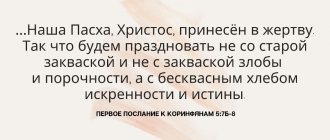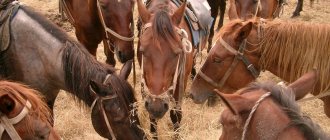"Save me, God!". Thank you for visiting our website, before you start studying the information, please subscribe to our Orthodox community on Instagram, Lord, Save and Preserve † - https://www.instagram.com/spasi.gospodi/. The community has more than 60,000 subscribers.
There are many of us like-minded people and we are growing quickly, we post prayers, sayings of saints, prayer requests, and timely post useful information about holidays and Orthodox events... Subscribe. Guardian Angel to you!
Most Orthodox Christians are sure that meat, as well as fast food, should not be eaten exclusively on days of fasting. However, in reality everything looks more complicated, because in the Old Testament you can find a fairly large list of those foods that are forbidden to be consumed not only during fasting, which also includes pork. But you will learn from our article why Orthodox Christians can eat pork or why it is forbidden.
Why Orthodox Christians Shouldn't Eat Pork
According to the scriptures presented in the Old Testament, eating animals that died a natural death (that is, which were not bled), as well as the meat of God’s creatures that were strangled, is prohibited. In addition, eating blood sausage and similar products that use animal blood are prohibited.
A prohibition of this kind is connected with the Holy Scripture, which says that animals have a soul - the soul of God’s creature is in its blood. Under no circumstances should you eat the soul of an animal along with its flesh. If a believer eats the blood of God’s creatures along with his food, he will acquire the image of the animal whose blood he consumed.
It should be noted that according to the Old Testament, unclean animal flesh mainly refers to:
- crabs, crayfish, and fish that lack scales;
- hares and rabbits;
- a dead animal (that is, without bleeding);
- fried blood of birds and animals;
- horsemeat.
But with all this, unclean meat, such as, for example, pork, is allowed to be consumed in times of hunger or need.
According to the Old Testament, you cannot eat certain animals, including horse meat.
Read the Old Testament, and you will see that there are many animals forbidden to eat. These are not only pigs, but also camels, horses, rhinoceroses, tapirs, hares, rabbits, and jerboas.
You can only eat
“every livestock that has cloven hooves and a deep cut in the hoof, and chews the cud.”
(Leviticus 11.3)
You should not eat seafood (crabs, crayfish, shrimp, shellfish, etc.). Of birds and fish - without feathers or scales.
You should also not eat birds: eagle, vulture, kite and falcon, any raven, ostrich, owl, seagull and hawk, eagle owl, fisherman and ibis, swan, pelican and vulture, heron, zoe, hoopoe and pipistrelle. All reptiles, winged, walking on four legs.
All the signs that Old Testament people should not eat meat are defined in the texts Leviticus 11:3-47, Deuteronomy 14:3-20. They indicate the characteristics of clean and unclean animals, which include all creatures living on earth.
Why is the question focused on pork meat? The Bible says that you cannot eat the horse meat from which Moscow sausage is made. The meat of ostriches, nutrias and other prohibited animals is sold.
What Scripture Says
However, why do Orthodox Christians eat pork almost as an everyday dish, without any special need? As for this type of meat, it’s also not so simple, because the following words are given in the Holy Scripture about this:
“But a pig, although it has two hooves, does not chew the cud, is unclean to you; You shall not eat their meat and do not touch their corpses” (Bible. Deuteronomy 14:8).
It is important that all existing prohibitions on eating pork are indicated only in the Old Testament, because the main purpose of such a law was considered to be that it was to prepare Orthodox people for the coming of Jesus Christ, the Son of God. Here's what the biblical apostle Paul said about this:
“Therefore the law was our guide to Christ, that we might be justified by faith; But when faith comes, we are no longer under a teacher” (Gal. 3:24,25).
Therefore, with the coming of the Savior, according to the New Testament, the need to adhere to the ritual law simply disappeared, and even more so, if convincing believers to follow it would mean erecting a wall between the pagan peoples and the Holy Scriptures.
Therefore, the Lord sent down a special Revelation explaining this:
“The next day, as they walked and approached the city, Peter, about the sixth hour, went up to the top of the house to pray. And he felt hungry and wanted to eat. While they were preparing, he went into a frenzy and sees the open sky and a certain vessel descending towards it, like a large canvas, tied at the four corners and lowered to the ground; in it were all four-legged creatures of the earth, animals, reptiles and birds of the air. And a voice came to him: Arise, Peter, kill and eat. But Peter said: No, Lord, I have never eaten anything bad or unclean. Then another time a voice came to him: What God has cleansed, do not consider unclean” (Acts 10:9-15).
It follows from this that any person is free to eat or not eat pork, and this will not in any way affect his relationship with the Almighty.
The Lord is always with you!
Quotes from the Holy Letter
In the modern world, Orthodox people fast, for the most part, refusing fish, meat and dairy products.
Fasting must be accompanied by fervent prayer, otherwise such fasting will be similar in nature to a regular diet. But you shouldn’t abuse it either.
About posts:
Fasting in OrthodoxyKonin in OrthodoxyHow to fast correctly on Wednesday and Friday Important! The Holy Fathers said that fasting was created for man, not man for fasting. In this case, abstaining from meat can help pacify human flesh, thereby helping to create a favorable state for prayer and repentance during fasting.
That is why monks are forbidden to eat meat. Christians are prohibited from consuming the blood of animals, since it is said that the soul of an animal is in the blood. There are no other food prohibitions in the New Testament for Christians.
The Orthodox Church believes that pork dishes are completely acceptable
As evidence, one can cite quotes from the books of Holy Scripture. For example, for ritual purity, Jews were forbidden to eat the meat of such animals:
“Don’t eat any nasty stuff. These are the livestock that you may eat: oxen, sheep, goats, deer and chamois, and buffalo, and fallow deer, and bison, and oryx, and camelopard. Any cattle that has cloven hooves and a deep cut in both hooves, and that chews the cud, you shall eat; Just do not eat these from those that chew the cud and have cloven hooves with a deep cut: camel, hare and jerboa, because although they chew the cud, their hooves are not cloven: they are unclean for you; and a pig, because its hoofs are cloven, but does not chew the cud: it is unclean to you; You shall not eat their flesh, nor touch their carcasses (Deuteronomy 14:3-8).”
Already in the New Testament we see how Christ relates to such things: “It is not what goes into the mouth that defiles a person, but what comes out of the mouth defiles a person (Matthew 15:11).”
Further, the holy apostles, by the grace of the Lord, preach and teach other nations: “Food does not bring us closer to God: for whether we eat, we gain nothing; if we eat, we lose nothing (1 Corinthians 8:8).”
“To the pure all things are pure; But to those who are defiled and unbelieving, nothing is pure, but their mind and conscience are defiled (Titus 1:15).”
As was said earlier, the only thing the apostles warned about was: “For it pleases the Holy Spirit and us not to lay on you any more burdens than these necessary: to abstain from things sacrificed to idols and blood, and things strangled, and fornication, and not to do to others what you do not want for yourself (Acts 15:28-29).” It says here that you cannot consume the blood of animals and the meat of a dead animal that has not been bled.
The last proof that Orthodox Christians are allowed to eat everything: “Eat everything that is sold at the market without any examination, for peace of conscience; For the earth is the Lord's, and the fullness of it. If one of the unbelievers calls you and you want to go, then eat whatever is offered to you without any examination, for peace of conscience (1 Corinthians 10:25-27).”
Naturally, any person, and especially an Orthodox Christian, should have an understanding of moderation in eating food. You need to calculate what and how much you need to eat, so as not to later confess to the sin of gluttony.
Is it possible to eat pork? Archpriest Vsevolod Chaplin
Similar articles
Is it possible or not for Orthodox Christians to eat horse meat? Is it possible to eat bread during Lent? Do animals have souls? What can you cook and eat during the second week of Lent?
Are Christians allowed to eat pork according to the Bible?
Published 11/14/2017
A lot of people are interested in whether Christians can eat pork. What does the Bible say about this? In fact, the answer is very simple, let's figure it out. We will first look at the practice of the Old Testament for the people of Israel, and then look at the teaching of the New Testament. Thus, we will look at all the teachings of the Bible regarding whether modern Christians can eat pork.
Pork in the Old Testament
The Old Testament contained instructions for the people of Israel regarding what foods they could and could not eat. The book of Deuteronomy talks about this, for example:
“You can eat any animal that has cloven hooves and chews the cud, but do not eat camels, hares and jerboas, because although they chew the cud, their hooves are not cloven, and therefore this food is unclean for you. And don’t eat pigs either: although their hooves are cloven, they don’t chew the cud, pigs are unclean food for you; Do not eat swine’s flesh or even touch the carcass of a swine” (Deuteronomy 14:6-8).
In fact, there are not many passages in the Old Testament that talk about eating pork. However, they all prohibit its use. In the book of the prophet Isaiah there is a speech of God, where God speaks in a negative way about those people who eat pork:
“They always provoke Me to anger, offer sacrifices and burn incense in their gardens. They sit among the graves and wait for news from the dead, they live among the dead, they eat pork, their knives are dirty with rotten meat" (Isaiah 65:3-4).
Thus, according to the Old Testament, pork meat could not be eaten by the Jewish people. Pork could not be sacrificed to God. You couldn't even touch the pork. This food was considered unclean.
Why couldn’t the people of Israel eat all these types of food (for more details, see the passage from Leviticus chapter 11, verses 1 to 47)? Israel was to obey God's absolute standards. The second reason for this diet was to make it difficult for the people of Israel to eat food near or in the presence of nations that worshiped idols. The food laws served as a barrier to the mingling of the Israelite people with idolatrous nations. Proper nutrition and health benefits were obvious, but this was only a secondary concern of God after obedience and separation.
Results
- The Bible does not prohibit Christians from eating pork.
- Food restrictions were given to the Jewish people so that they could maintain their “purity” among the Gentiles.
- The New Testament abolished the Old Testament agreement. Jesus said that “the Sabbath is for man, and not man for the Sabbath,” thereby placing rituals second only to spiritual development.
- Christians are discouraged from eating pork if it “troubles their conscience.”
- Proper nutrition and the ban on eating fatty foods do not have a religious platform.
When using materials from thebestvideo.ru, a link to the source is required.
Pork in the New Testament
The word Covenant means “agreement” or “contract.” When you have one agreement and then you are about to enter into a new one, then the new agreement becomes the basis of the current relationship. This is how the New Testament (new agreement) replaced the Old Testament (old agreement). This is how the writer of Hebrews describes the need for a new agreement:
“If that first agreement had been flawless, then there would have been no need for another agreement. But God found them guilty and said: “The days are coming,” says the Lord, “when I will enter into a new agreement with the house of Israel and the house of Judah. And this agreement will not be the same as the one I made with my ancestors on the day when I took them by the hand to lead them out of the land of Egypt, for they did not remain faithful to My agreement, and I turned away from them, says the Lord. This is the agreement I will make with the people of Israel after these days, says the Lord. I will put My laws in their minds, write them in their hearts, and I will become their God, and they will become My people. And there will be no need for anyone to teach his fellow tribesmen or fellow citizens, saying, “Know the Lord,” for they will all know Me, from the least to the greatest. I will be merciful to their misdeeds and forget their sins.” By calling this agreement “new,” He made the first one obsolete, and whatever becomes obsolete and useless soon disappears” (Hebrews 8:7-13).
Thus, we now understand why that agreement became outdated and “useless”, and was replaced by a new agreement - the New Testament.
The concept of a Christian first appears on the pages of the book of Acts, and at that time the New Testament had already come into force. Therefore, Christians are under the New Covenant, not the Old Covenant, and are not required to submit to the requirements of the Old Covenant. It is worth mentioning that the New Testament largely repeats the commandments of the Old Testament, but more on that another time. We are now interested in whether Christians can eat pork? Let's look now at a passage from the New Testament:
“Eat any meat sold at the meat market without asking questions caused by reproaches of conscience, for “the earth and everything on it belongs to the Lord.” If a non-believer invites you and you decide to go, eat whatever is put in front of you without asking questions out of remorse. But if someone says to you, “Here is the meat that was offered as an offering,” then do not eat it, for the sake of the person who told you about it and for the sake of your own conscience” (1 Corinthians 10:25-28).
The New Testament nowhere prohibits Christians from eating pork. Moreover, the New Testament does not set forth any laws regarding the consumption of any food. If we talk about the passage above, it is clear that it is permissible to eat any meat. Not only is it permissible to eat meat (this is if someone asks whether, according to the Bible, it is possible to eat meat at all or whether one must be a vegetarian), but it is permissible to eat any meat. Including all those types of meat that were prohibited in the Old Testament, including pork.
Why in some cases you shouldn’t eat pork, for example? The Bible explains this by the conscience of other people nearby. Can a Christian drink alcohol? The Bible nowhere forbids drinking alcohol (there are instructions against drunkenness, but not against drinking alcohol as such), but in some cases it is better not to drink it at all. For example, when there are people nearby who are struggling with alcohol addiction, children, etc. In the case described above, pork should not have been eaten because of the other person's conscience.
So, is it permissible for a Christian to eat pork according to the Bible? Yes, you can. But in some cases this should not be done because of the other person's conscience.
In the Gospel, the Lord lifted the ban on pork and allowed us to eat the meat of any animal.
The severity of the Old Testament in relation to food and other conventions is determined by the tendency to temptations of the Old Testament man, and the constant fascination with paganism. The restrictions were educational in nature so that the People of God would not deviate from the One God.
This isolation from paganism achieved results, and the Savior was born among this people. He not only declared food clean, but also equated all people with Jews. He constantly irritated the Jews by neglecting the Sabbath. Misunderstanding of these truths was one of the reasons for the execution of Christ and his followers.
Christ tried in vain to convey to the Jewish people that all uncleanness lies in the heart and thoughts, and not in non-observance of rituals and food. This idea was repeated many times by the apostles.
(Titus 1.15)
“To the pure all things are pure; But for those who are defiled and unfaithful, nothing is pure, but their mind and conscience are defiled.”
Deanery
Hello! Please explain why Christians were first forbidden to eat pork, and then allowed in the New Testament. Nothing has changed for Muslims. Who made these changes and why? I read the New Testament and still did not find any specific permission to eat pork. I want to be a real Christian, and I would like to understand this issue. If it’s forbidden, then so be it, but I don’t want to sin. Thank you.
Leonid
Answered by Priest Grigory Barashko
Let us immediately remember that the ban on eating unclean animals (including pork) was given by God to the people of Israel in the Old Testament through the prophet Moses. But what happened before that?
Before the fall of Adam and Eve, of course, there was no meat food at all.
“And God said, Behold, I have given you every herb yielding seed that is on all the earth, and every tree that has fruit yielding seed; - This will be food for you; And to every beast of the earth, and to every bird of the air, and to every thing that creeps on the earth, in which there is life, I have given every green herb for food. And it was so” (Genesis 1:29-30).
After the Fall, although nothing is specifically said about this, apparently, meat could already be eaten, as can be seen from the fact that the son of Adam and Eve Abel was a shepherd of sheep.
But it was only after the flood that the Lord pointed out to Noah directly: “Every moving thing that lives will be food for you; I give you everything like the green grass” (Genesis 9:3). It is important to note here that it was still possible to eat everything, that is, all animals.
Further in the chronology, you remember that from Noah the human race began to spread across the face of the earth and soon many of his descendants (mainly from the sons of Ham and Japheth) began to forget the True God and became pagans. Forgetting God, these peoples led a sinful lifestyle and all their deeds, at all times, were evil.
It was then that the Lord wanted to separate His chosen people (those who maintained the true faith) from the pagans by commanding them through Moses to strictly observe certain laws (one of which forbade the Jews from eating unclean animals).
Let us look at the text of the Holy Scripture: “You are a holy people to the Lord your God, and the Lord has chosen you to be His own people from among all the nations that are on earth. Don't eat any nasty stuff. Here are the livestock that you can eat: oxen, sheep, goats...” (Deut. 14: 2-4), then the animals that you cannot eat are listed. This relationship is clearly visible here - selection from other peoples and a selective approach to food.
This law, like many others, was supposed to protect Jews from close communication with pagans, which always led to the corruption of morals and, as a result, a distortion of faith.
It must be pointed out that the symbolic side of the issue is also of great importance. The Old Testament is full of symbols: the Burning Bush represented the Mother of God, the son of Abraham Isaac represented Christ Himself, the passage of the Jews through the Red Sea represented the sacrament of baptism, etc., etc.
Unclean animals were prototypes of pagan peoples.
Let us remember the vision of St. Peter, who saw “the sky being opened and a certain vessel descending towards it, like a large sheet, tied at the four corners and lowered to the ground; in it were all four-legged creatures of the earth, animals, reptiles and birds of the air. And a voice came to him: Arise, Peter, kill and eat. But Peter said: No, Lord, I have never eaten anything bad or unclean. Then another time a voice came to him: what God has cleansed, do not consider unclean. This happened three times; and the vessel ascended again into heaven” (Acts 10:11-16). This vision showed the ap. Peter that the faith of Christ should henceforth spread among other pagan peoples. Which is what subsequently happened.
Impure peoples, through the adoption of the true faith, were purified, and the ban on eating “unclean” animals was abolished, like many other laws and rituals of the Jewish people.
At the Apostolic Council (see Acts, Chapter 15) it was specifically determined that newly converted Christians, from pagan believers, would not observe any rituals or laws of the Jews, but only “that they should abstain from what was defiled by idols, from fornication, strangulation and blood.” , and so that they don’t do to others what they don’t want for themselves.”
The following scripture may also be interesting:
“The Spirit clearly says that in the last times some will depart from the faith, giving heed to seducing spirits and teachings of demons, through the hypocrisy of liars, having their consciences seared, forbidding marriage and eating what God created so that those who are faithful and know the truth ate with thanksgiving. For every creation of God is good, and nothing is blameworthy if it is received with thanksgiving, because it is sanctified by the word of God and prayer” (1 Tim. 4:1-5).
Now, according to your question, we can conclude: the ban on eating pork was canceled by God Himself through St. apostles, canceled because it has lost its meaning and relevance.
Why don't Buddhists eat pork?
There are many indications about the manifestation of compassion in the Sutras. I won't list them. But in the legend given below all the caring of the Blessed One towards his neighbor is expressed.
“Chunda, the blacksmith, hearing that the Blessed One had come to Pav and stopped in the grove, went to him and, having shown respect, asked the Blessed One to attend his meal the next day. Having received consent, Chunda left and by the next morning prepared all kinds of dishes, as well as a large piece of juicy pork. The Blessed One, accompanied by his disciples, arrived at the blacksmith’s house. Sitting down on the prepared seat, he turned to the blacksmith Chunda: “Chunda, bring me the pork you have stored, and give the students the other dishes you have prepared.” “Yes, sir,” answered the blacksmith and did as instructed. Then the Blessed One said: “Chunda, bury whatever pork you have left in the ground, for I do not know a being other than the Tathagata who could appropriate it.” “Yes, sir,” replied Chunda and buried the rest of the pork in the ground. Having eaten food in the house of the blacksmith Chunda, the Blessed One fell ill with a severe stomach illness, and, experiencing severe pain, said to the disciple Ananda: “Get up, Ananda, we will go to Kushinagara.” On the way, the Blessed One often stopped, experiencing severe pain, thirst and languor. So they reached the Kakutha River; here, having taken a bath, the Blessed One stopped at the edge of the forest, lay down on the spread out clothes and turned to Ananda: “Ananda, it is possible that someone will upset the heart of the blacksmith Chunda with the following speeches: “Chunda, this is a big nuisance for you, and you should feel very unhappy , that the Tathagata left the transitory after he took a meal in your house.” Ananda, drive away Chunda’s heavy thoughts with the words: “Friend, you should rejoice, for this is your happiness that this happened. From the mouth of the Tathagata himself I heard and understood that gifts of food receive equal appreciation and reward. Indeed, they receive greater reward and blessing than others. Which two? The one after which the Tathagata achieves the highest, complete illumination, and the one after which he enters into the liberation of Nirvana.” With such speeches, Ananda, you should dispel the heavy thoughts of the blacksmith Chunda.” Mahaparinirvana Sutra Thus, the Blessed One not only debunked future myths about the Buddha-god, but also very clearly showed the harm and consequences of eating meat.









